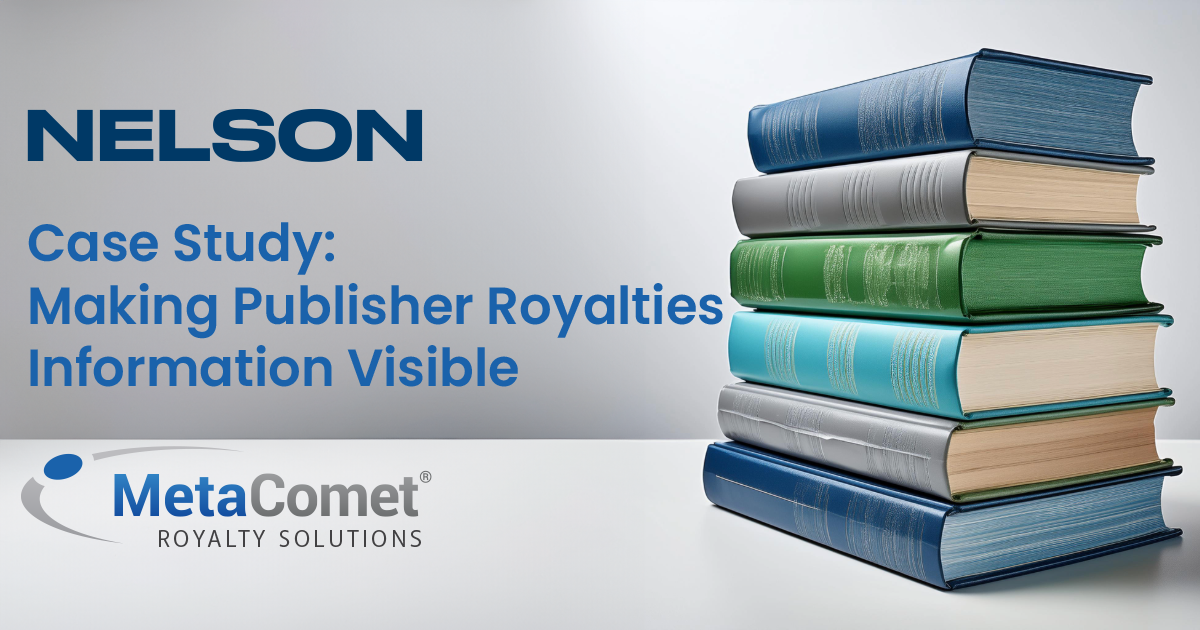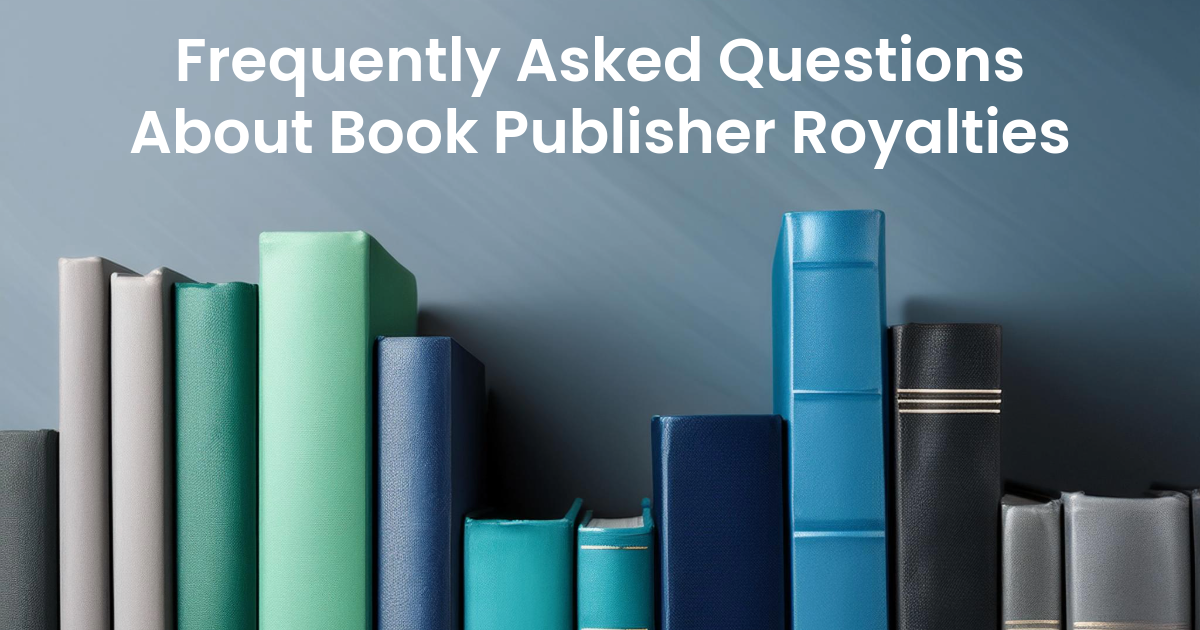Case Study: Nelson Automates Their Publisher Royalties
Nelson is Canada’s leading K–12 educational publisher, currently distributing thousands of products and managing tens of thousands of royalty agreements. MetaComet® Systems spoke with Nelson’s Royalty Manager, Sandra Mouratidis, about how the company’s recent transition to Royalty Tracker® has created clarity and transparency throughout the royalty management process — and beyond.
Publishers managing thousands of royalty agreements like Nelson find that MetaComet’s Royalty Tracker® creates complete transparency and eliminates manual calculation errors instantly.

Why Did Nelson Opt for a Royalty Software Upgrade?
Nelson’s previous royalty system was functional but lacking in some key features. Sandra mentioned that contract notes were difficult to view, there was no option for setting a contract term expiration, and no way to track third-party rights income.
Amid Nelson’s recent modernization initiatives, they upgraded their ERP system to Oracle NetSuite. MetaComet® Royalty Tracker® software complements NetSuite, and Nelson identified it as their most cost-effective royalty processing option.
Fortunately for Sandra, the sole member of her royalty management department, choosing the cost-effective solution did not require skimping on quality customer service. She says, “The onboarding was completely left up to me. There was nobody else at Nelson helping me look at the files, revamp the files. Alex (MetaComet’s Director of Customer Success) was so pivotal in helping me to manage that and make sure that everything was working correctly in the test environment before we went live.”
The Sometimes Surprising Benefits of Royalty Automation
The accuracy and usability of Royalty Tracker paid off immediately for Nelson. “The result of Royalty Tracker is that our accounting is much, much more accurate,” says Sandra. “Royalty Tracker is really, really easy to use. There’s nothing hidden. The naming consistencies of the fields are the same right across the board. A lot of the times I might send a question to Alex and then two seconds later I figure it out on my own. There’s more visibility on everything: the calculations, the royalty terms, and more.”
Sandra has found that the reporting functionality in Royalty Tracker makes it valuable for more than the standard royalty calculations and statements. “It doesn’t matter what you’re looking at. There’s a report that’s going to bring in the information that you need. Alex said to me when I started, ‘This sales reconciliation file is going to become your Bible.’ It is. There’s so much information on it. There’s so much that can be used for other things.”
For example, Nelson recently changed their accounting cycles and Sandra now needs to close her publisher royalties a few days before the end of each month. The Royalty Tracker sales reconciliation report gives her the flexibility to make that change while maintaining accurate calendar month accrual information.
Perhaps the most unexpected benefit of using Royalty Tracker is that Nelson can use it to manage income as well as royalty payouts. “Prior to this, rights income was all being calculated manually. It was a nightmare. It was difficult to keep track of author changes, new authors, and beneficiaries, and recalculate the pro-rate assigned to each. Sometimes, things were missed and we would assign an income to a deceased author. We also spent an immense amount of time copying the details to the allocation spreadsheet and setting the calculations. It was incredibly time-consuming. Anyhow, now we can import via the sales file and let the system do all the work. Cuts the time in half.”
“Because of the way the royalties are set up and you can set up the terms, the possibilities are endless as far as I’m concerned,” says Sandra.
Royalty Software Is Accounting Software
For Nelson, Royalty Tracker has proven to be a complete, reliable solution for royalty management. As an unforeseen bonus, it has helped them conquer other accounting challenges as well. Says Sandra, “I don’t know that there’s anything that it doesn’t do.”

Frequently Asked Questions About Book Publisher Royalties
Sandra is an experienced royalty manager, but if you’re new to the book publishing business, you may be wondering about some of the questions below.
How do publisher royalties work?
The calculation of royalty payments is complex, with rules that differ across publishers based on their contractual arrangements with authors. Several factors can affect these calculations:
- Sales: Number of copies sold during the specified period.
- Price: The book’s list price.
- Type of royalties: Whether the royalties are based on retail or net figures.
- Royalty rate: The current rate and any escalators in effect.
- Discounts: Discounts given to retailers.
- Returns: The volume of book returns during the royalty period.
- Reserve: Reserves maintained by the publisher.
- Advance: Whether the royalties have reached the earn-out threshold.
Visit this article for more details on how book publisher royalties work.
Who is entitled to publisher royalties?
Before publishing a book, the publisher and author (or other contributors) negotiate and agree upon royalty terms, which are recorded in a contract. Thereafter, the contributors are entitled to any royalty earnings according to the contract agreement.
How are publisher royalties split?
Royalty rates can differ significantly. In hybrid publishing models, where both publishers and authors share the production costs, higher royalties are common, ranging from 50% to even 90% of net sales.
In traditional publishing models, where the publisher assumes most of the financial risk, the royalty rates are lower and typically based on net sales. For example, ebook royalties might be 25% to 50%, while paperback royalties are around 10%.
Hardcover book royalties in traditional publishing often use a percentage of the list price instead of net sales.
Royalty rates can also vary for highly discounted sales.
When publishers sign a contract with an author, they often acquire all rights to the content. They may license these rights to others, such as foreign publishers or for film and TV adaptations, known as subsidiary rights. Royalties from these sources are usually around 50%.
How long do publishing royalties last?
Book royalties are typically paid for the entire duration of the work’s copyright. Under current U.S. copyright law, this means royalties can be collected for the author’s lifetime plus an additional 70 years. Consequently, an author’s heirs may receive royalties for up to 70 years after the author’s death, provided the book continues to sell.
See Royalty Tracker In Action!
If you’d like to see for yourself how MetaComet software can transform your royalty management process, schedule a demo with us today!

David Marlin is the President and Co-Founder of MetaComet® Systems, a prominent provider of royalty automation tools. Since founding the company in 2000, David has spearheaded the development of a suite of best-in-class systems that effectively facilitate royalty processes for nearly 200 publishers. David has also served as the chair for The Book Industry Study Group’s Rights Committee and Digital Sales Committee.
Before establishing MetaComet Systems, David served as a technology consultant for renowned publishers, collaborating with notable companies such as Random House, Penguin, HarperCollins, Holtzbrinck, Macmillan, Scholastic, Time Warner, and many others. David holds both an MBA and a BA from Columbia University in New York.
Contact Us
"*" indicates required fields

